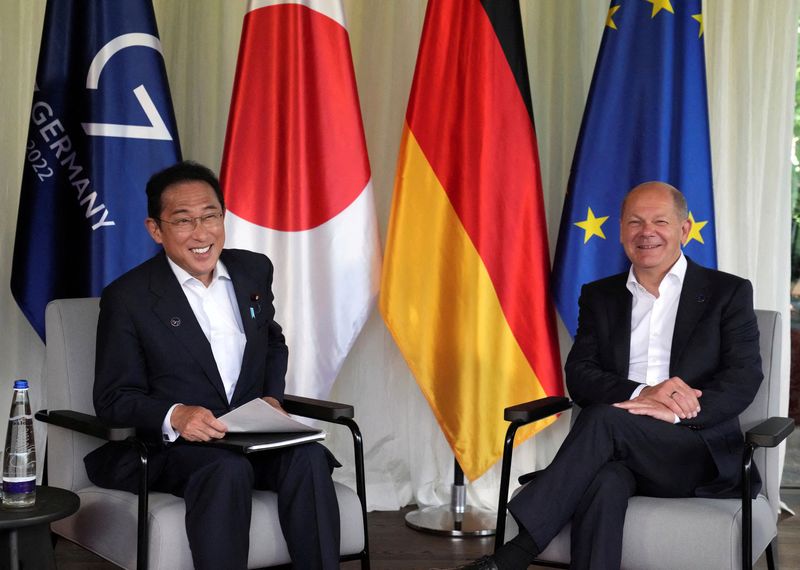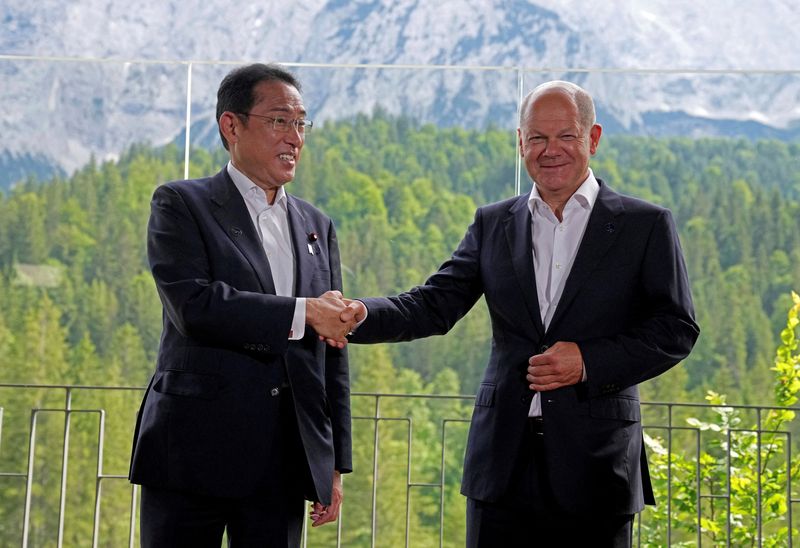By Sakura Murakami and Andreas Rinke
TOKYO (Reuters) -Germany and Japan agreed to cooperate closely on economic security on Saturday during their first ever high-ministerial government consultations, held amid tensions over global supply chains and economic disruptions caused by the war in Ukraine.
German Chancellor Olaf Scholz, accompanied to Japan by six ministers, is looking at ways to reduce German dependence on Chinese raw materials.
"The Russian invasion of Ukraine as well as the COVID-19 pandemic have made us painfully aware of the difficulties that can arise when there is too much economic dependency in critical areas," Scholz said at a news conference following the talks.
"We must react to this. Together with Japan and other partners, we are working on drawing the right conclusions from these experiences," he added.
In a joint statement, the two countries "affirmed their intention to strengthen cooperation on economic security" and to work towards establishing "a legal framework for bilateral defence and security cooperation activities, such as rendering logistical assistance and support".
'STRATEGIC AREAS'
Japanese Prime Minister Fumio Kishida said Germany and Japan aimed to boost cooperation "in strategic areas including mineral resources, semiconductors, and batteries, and share our best practices to counter risks in order to build a resilient supply chain that is safe and sustainable".
Germany holds inter-governmental consultations with a number of countries including France and China. German officials said the decision to hold its first such consultation with Japan was of considerable political and symbolic importance.
Given Japan's passing of a bill on economic security, Berlin hopes to learn about its raw material strategy and follow Tokyo's lead on how to cut dependency on imports, a German government official said of the visit.
In a move primarily focused at China, Japan's parliament passed an economic security bill last year aimed at guarding technology and reinforcing critical supply chains.
Trade between Germany and China rose to a record level last year, making the Asian country Germany's most important trading partner for the seventh year in a row despite political warnings in Berlin about excessive dependence.
Goods worth around 298 billion euros were traded between the two countries in 2022, up around 21% from a year before, according to data from the German statistics office.
Japan is Germany's second largest trading partner in Asia, but volumes in 2022 were less than a fifth of those with China.

Germany's centre-left government is now taking a tougher line towards Beijing than its centre-right predecessor and is exploring ways to wean itself off heavy reliance on China's economy.
"As democracies and as highly industrialized, export-oriented economies, Japan and Germany face similar challenges in shaping the digital and ecological transformation and strengthening the resilience of their economy in difficult geopolitical times," Franziska Brantner, state secretary in Germany's economy ministry, told Reuters.
